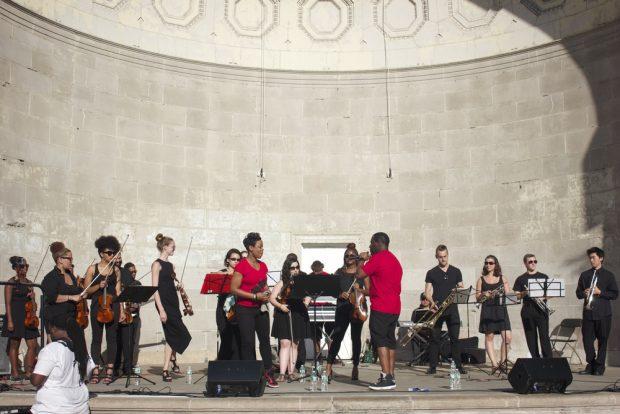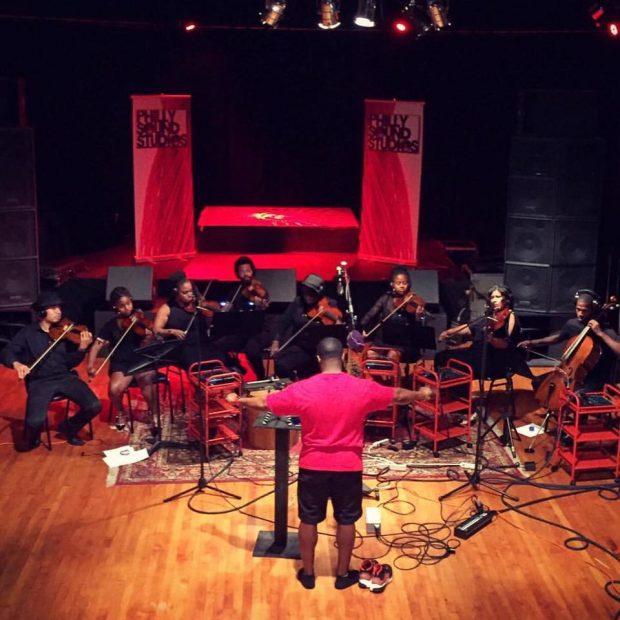Bartok and Breakbeats: Philly son Thee Phantom on bridging hip-hop and classical

The distance between the North Philly neighborhood of Jeffrey Mcneill’s youth and New York’s storied Carnegie Hall is roughly 97.5 miles. The aesthetic, economic and cultural gap between those two locales is far greater.
Like many kids growing up in the dawn of Hip Hop, McNeill quickly found himself fully immersed in the emerging culture, channeling his creative energy into the new music. True to hip-hop’s tendency of appropriating and recontextualizing older music, Mcneill began writing raps and raiding his father’s classical music collection, making tapes that reflected his curious desire to fuse hip-hop with the music of the European classical canon. After christening himself Thee Phantom, McNeill and his ILL Harmonic Orchestra have succeeded in bringing classical instrumentation and hip-hop flavor to stages around the world, fulfilling a lifelong dream of performing at Carnegie Hall.
Fresh off of a successful run at SXSW, McNeill finds himself on the sunny side of a decades-long uphill battle to win acceptance and bridge the seemingly impassible gulf between hip-hop and Hadyn, Bartok and breakbeats.
The Key: Ok. So, could you tell me a bit about your personal background and how you got your start in music? You’re from Philly, right?
Thee Phantom: I’m from Philly. Grew up in North Philly. Music has been a part of my life for as long as I can remember. I sang in the church choir when I was five. My dad had a pretty extensive record collection and I can remember sitting in front of the stereo playing records for hours as a child. I specifically remember [famed rock and soul label] Buddha Records with the Red Buddha on them. They frightened me, which made me want to listen to them even more. My mom put me in flute and piano lessons when I was about eight.
TK: Word. And where / how did hip-hop come into the picture?
TP: My father played “Rappers Delight” for me when I was eight. By that time I was already writing my own parody songs. I had a mock Thriller album that I entitled, Dinner. When I heard hip-hop, though, it felt way different. I felt like I found a voice that was my own. Two weeks later I wrote my own rhyme and recorded it on my portable tape deck. With the introduction to live instruments that I had with flute and piano lessons, combined with my dad having a collection ranging from Motown to Mozart, none of the sounds going on in my head sounded foreign.
TK: That’s interesting. It seems as though most artists I talk to, especially in hip-hop and punk for example, have a similar experience: get introduced to the music at an early age and almost immediately start figuring out ways to join in and start making it. I take it that even at an early age hip hop felt accessible to you?
TP: It felt really accessible. Seeing people that look like you, your friends, your aunts and uncles, doing stuff on stage, makes you feel as though you can do it. I tried every aspect of hip-hop. I was a Emcee, B-boy, graf artist, then DJ in that order.

Thee Phantom | photo courtesy of the artist
TK: That’s so real. I grew up watching my older brother’s rap group rock on stages and make beats and that experience set me up for life.
TP: Yessir! My brother and I had a B-Boy routine where our walk out music was Darth Vader’s “Imperial March.” I had that orchestral hip-hop thing from the beginning and didn’t even realize it.
TK: Wow! What year was this?
TP: ’86 / 87. I mixed Beastie Boys’ “Paul Revere” and Beethoven’s 5th Symphony that year when the single came out. I used my brother’s double tape deck to fuse the two together. It was just what I heard in my head.
TK: Word. It’s interesting to note that while, hip hop would have been something inherently inaccessible and relatable to a young black kid in North Philly, classical music would have been the exact opposite: white, antiquated, technically rigorous, etc. Except through hip hop and sampling, you were able to access classical music canon as well.
TP: Absolutely! I didn’t even realize how important my music lessons and little tape would prove to be on a myriad of levels. My mom just thought it would be a way to keep me off the streets, as North Philly was not a game even then. That was even slightly before crack [cocaine].
TK: Could you speak a little bit about how Thee Phantom came to be and how you made the jump from sampling classical records to forming an Orchestra?
TP: I took the tape to my best friend’s house. I remember vividly! I was so proud of the beat. Hip-hop was still largely drums and little melody. I played it for him on his little boom box. He ejected it and flung it across the room. He told me hip-hop and classical music would never work.
TK: Whoa.
TP: At that point I became married the idea because I needed to prove him wrong. I kept honing the music and writing. My first DJ wasn’t too keen on the idea either so I kept it under wraps while we sampled James Brown like everybody else. After I left that group, I just decided to go with the music I had in my head. I interned at Third Story Recording in West Philly in the 90’s and just made beats in their spare studio. They made (Schoolly D’s massive single) “PSK (Parkside Killers)” in that room.

Thee Phantom | photo courtesy of the artist
TK: By the 90s, were people more accepting of the idea? You did have folks like RZA exploring a tenuous relationship between rap and classical by that point.
TP: Not live. Coolio did it at the Grammys with a string section, but that was about it. I got the side eye when I hit the stage in ’99 with a string quartet. I read in the Philly Weekly one day, that someone (artistic director and Classical music innovator Eric Haeker) at the newly built Kimmel Center, was looking to bring in a younger audience. He was mixing Classical with a few different genres including Hip-Hop. That was my cue. I took my demo tape down there and asked for a meeting. I played it for him and he said I’d like to pair you with members of the Philadelphia Orchestra and Chamber Orchestra of Philadelphia. I rocked with them at the Kimmel Center’s inaugural Summer Solstice in 2001.
TK: Word. What kind of reception do you and the orchestra get nowadays? You just played SXSW?
TP: In the beginning it was tough. I even tried to drag members of the Philly Orchestra out to the club for a few gigs. It was hilarious looking back on it. They didn’t like the idea of playing 8 to 16 bar loops of Vivaldi and Beethoven, but it was where I was at the time. Nowadays, I use younger musicians who have grown up listening to classical and hip-hop much like myself. You can feel their connection in the performances. The audience feeds off of it. We usually open the show with “B-Boy Meets Beethoven” and it blows the roof off the venue.